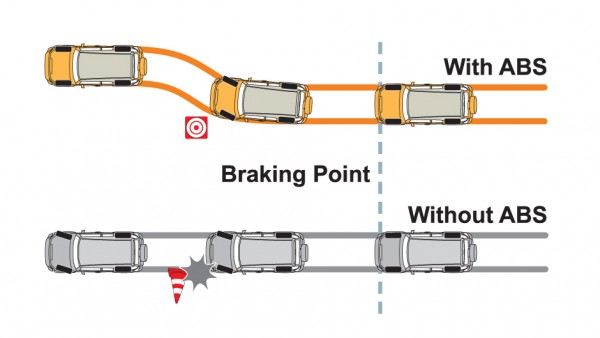If you’re wondering what special contraption can help cars stop quickly, it’s not beefed-up brake pads – welcome to the world of ABS (anti-lock brake systems). These are relatively touchy systems that are activated in ‘panic braking’ situations or when road conditions aren’t favorable.
Commercial car fleet manufacturers often implement different specifications of ABS, yet we’ll give you a generalized idea as to what anti-lock brakes are and why people should complain the first time the brakes don’t work properly on their vehicles. You’ll see that without these mechanisms, motorists risk a perilous commute.
ABS 101: What you need to know
A modulation device that autonomously aids the braking system to stabilize traction control, the four-wheel system we call ABS helps the motorist in maintaining steering control in the most adverse conditions that persist, such as rain, ice or other poor weather or road conditions. Not only will you have the ability to maintain control over your vehicle, you’ll be able to stop much more quickly than vehicles which lack ABS mechanisms.
You will often feel somewhat of a throbbing sensation on the brake pedal when anti-lock braking is engaged. There are a few mechanical processes that occur when the ABS system is used; we’ll put them in layman’s terms for everyone to understand.
As you apply the brakes, the master cylinder pushes fluids into the hydraulic control unit, which then is applied to your brakes in conditions when your wheels could potentially lock up. Different sensory controls help to closely monitor the integrity of your rear and front wheels to deploy the ABS system when necessary.
Nearly all SUVs and smaller trucks will have rear wheel anti-lock braking systems to reduce the potential for rear-wheel locking. On all cars and trucks, having the wrong size of tires will affect the performance of your ABS systems since weight distribution between tires is a large part of how ABS is engaged; the master cylinder is also huge in maintaining ABS continuity.
Many new innovations to native ABS systems are in the works. An industry expected to top $42.6B by 2022, anti-lock brakes are definitely necessary, although sometimes difficult to understand the need for.
Straight steering is sustained – in theory
The general process of ABS systems is to allow you to maintain steering control during an incident that causes your wheels to head in the wrong direction; it’s not meant for quicker braking, although the system does apply pressure slightly faster when ABS is deployed. And as we all know, when an accident occurs and you have no control over your car’s direction, you’re pretty much toast.
If you are unsure if your anti-lock braking system is operational, take your vehicle to a local mechanic for a quick inspection to make sure all ABS functions, cylinders and sensors are prepared to act when needed.
A few things to keep in mind when slippery conditions occur: first, never pump the brakes on vehicles with ABS; you’ll take much longer to stop because your ABS will think you’re in control of the vehicle.
You should also keep your brake pads, calipers and other necessary parts in good working order as not doing so could adversely affect your overall ABS performance. Finally, should your anti-lock brakes fail you, the system will automatically revert to normal braking, keeping you safe and allowing your car to continue to stop in ample time.
ABS can fail – sometimes
Driving on slick, snow-packed surfaces poses challenges even for the expert driver. On these and even on rainy surfaces, many drivers find how human ABS brake systems become.
When ABS brakes are engaged on slippery surfaces, you’ll notice that they stutter. This is the system overcompensating for the lack of traction; as ABS brakes are generally good for faster braking in situations where shorter braking distances persist, they’re not great when they’re working against themselves.
Although Road and Track points out how ABS brakes are modern miracles in automotive engineering, humans can override ABS on slicker surfaces simply by slowing their braking sequence to ‘taps.’ No, you can’t slam the brakes on icy inclines or in a snow-covered Walmart parking lot to test ABS integrity – unless you’re testing out the new Mustang.
They’ll save your tail
Older cars that are not outfitted with ABS are missing out. Their aluminum bodies make wonderful battering rams when they’re unable to stop on command — one reason some auto enthusiasts suggest putting ABS systems in older cars.
Love or loathe them, ABS systems can save your hind end when weather conditions aren’t favorable.









